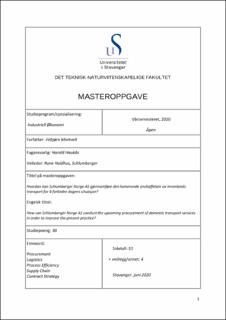How can Schlumberger Norge AS conduct the upcoming procurement of domestic transport services in order to improve the present practice?
Master thesis
Permanent lenke
https://hdl.handle.net/11250/2683411Utgivelsesdato
2020-06-13Metadata
Vis full innførselSamlinger
- Studentoppgaver (TN-ISØP) [1451]
Sammendrag
Schlumberger Norge AS is conducting a procurement of domestic transport services in the near future. The company aims toward establishing an automated logistical process in the future. However, the writer found that certain barriers must be eliminated in order to achieve that goal, some of which could be solved during the next procurement process. Thus, the problem statement is: “How can Schlumberger Norge AS conduct the upcoming procurement of domestic transport services in order to improve the present practice?”
The objective of the thesis is to provide the company with a theoretical and analytical foundation on which said procurement process could be based. While the theoretical foundation is constructed from relevant procurement, supply chain and project management theory, the analytical part of the thesis is based on extracted data from the current logistical system. In other words, the writer has made an effort to provide general suggestions regarding the conducting of the procurement process in addition to an analysis of the current practice, with subsequent improvement suggestions.
The results indicate that Schlumberger Norge could benefit from making a few changes in advance of the upcoming procurement process. Two major bottlenecks in the logistical process are identified, both of which can be solved in the upcoming procurement process. First of all, the amount of contracted shipments could be heavily increased by requesting a few additional requirements to be included in the contracted agreements between Schlumberger and its suppliers. Secondly, the pricing model of said contracts should arguably be changed to a simpler version that eliminates the current high deviation between estimated transport costs and actual invoiced costs. These identified bottlenecks are direct barriers toward an automated logistical process. Furthermore, suggestions regarding the general procurement process are stated.
Beskrivelse
Master's thesis in Industrial economics
